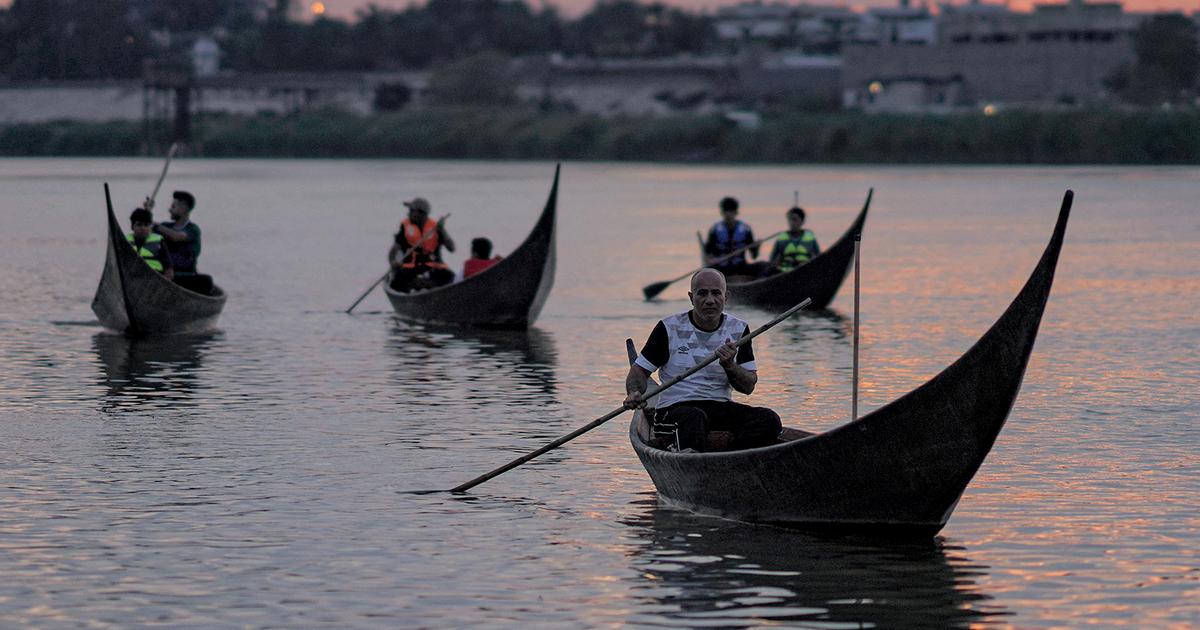Sailing on the Tigris River in Baghdad, young Iraqis lead traditional boats. In drought-stricken Iraq, the show is designed by an artist who wants to preserve these swamp gondolas, whose tradition dates back to the Sumerians. It is necessary to save "from extinction an essential facet of our civilization, which has existed for four or five millennia," argues Rachad Salim, a 62-year-old painter and sculptor and founder of the NGO Safina Projects.
Because the Meshhouf, this elongated gondola, built of wood and with a tapered end, has kept the "same shape since the time of the Sumerians", prestigious Mesopotamian empire irrigated by the Tigris and Euphrates rivers in southern Iraq. In 2018, Rachad Salim went in search of the latest Meshhouf manufacturers. He found them in Huweir, a southern town on the edge of the famous Iraqi marshes.
To rescue from oblivion this boat threatened since the 1980s by the proliferation of motorized boats, he places orders for Meshhouf, associates with nautical clubs or founds teams to teach young people how to maneuver it. On a spring afternoon in Baghdad, they are some twenty years to sail on 18 boats, on the occasion of a river show presented during a cultural festival. Equipped with a paddle, with strokes of oar from left to right, they struggle to stay the course.
" READ ALSO I remember Fallujah, Feurat Alani: Baghdad, my love
"Communicating" with nature
Among the participants, some have been rowing for only a month, such as Omar Youssef, 21, who has been windsurfing and sailing solo for five years. "These disciplines depend on the wind, you have to keep the balance with your body," he explains. His new sport involves working "shoulders and arms". The Meshhouf is part of "the history and heritage of the country," he said.
To date, seven clubs have been founded, in Baghdad, the central province of Babylon and southern Iraq, with British funding and the Aliph Foundation, the International Alliance for the Protection of Heritage in Conflict Areas. The initiative allows young people "to communicate with the environment," says Rachad Salim. In an Iraq hit by climate change and drought, he laments the "terrifying" state of rivers, in terms of "salinity of water or pollution".
Nephew of the famous sculptor and painter Jawad Salim, this artist born into an Iraqi-German family is passionate about Iraqi vernacular. In 2013, aboard traditional boats, he participated in a 1,200 km expedition on the Tigris River, from southern Turkey to the extreme south of Iraq, organized by the NGO Nature Iraq. This was not his first adventure. In 1977, he was the youngest crew member of the Tigris, Norwegian Thor Heyerdahl's huge reed ship, which sailed 6,800 kilometers on the high seas in 143 days.
From southern Iraq to the Arabian Sea, Pakistan and finally Djibouti, the journey aimed to prove that the ancient civilizations of Mesopotamia, Egypt and the Indus Valley were in contact via the seas.
" READ ALSO In Iraq, the ancient heritage threatened by repeated sandstorms
'Renaissance'
As with the Meshhouf, Rachad Salim wants to resurrect the Guffa, a round boat similar to a large wicker basket, whose size can exceed two meters in diameter. But he would also like to find financially viable solutions to sustain his project and guarantee "jobs".
400 kilometres further south, forty-year-old Zouheir Raisan remembers how, as a child, he helped his father and brothers make Meshhouf in Huweir, ranging in size from five to 11 metres. "It's been 30 years since we stopped," he adds. But for four years, he has taken up this craft again. In the shade of a traditional reed structure, the mudhif, he saws planks and helps his cousin nail them to a Meshhouf.
But he has not given up his job as a truck driver because it is impossible for the moment to live from his secondary activity. "The demand is not enough," laments the father of eight. "I wouldn't be able to meet the expenses of my household. Countries are coming in search of this heritage, to encourage its rebirth," he said. "Why don't we revive it ourselves?
»












